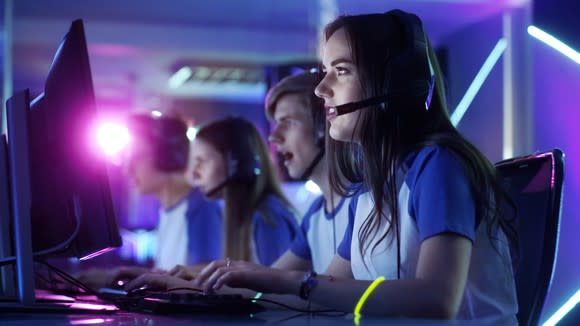Esports May Be Its Own Worst Enemy
Esports may be the biggest growth opportunity in the video game industry today, led by Activision Blizzard's (NASDAQ: ATVI) Call of Duty World League and Overwatch League. Electronic Arts (NASDAQ: EA) and Take-Two Interactive (NASDAQ: TTWO) are also watching the industry closely and forming their own leagues and partnerships to exploit the opportunity.
Turning esports into a big business may be a tantalizing proposition for companies and investors, but it's not easy. And the biggest problem isn't technology or market adoption -- it's trying to turn gamers who have mastered their craft at home and in corners of the internet that are rarely monitored into public figures accountable for what they say and do 24/7.

Image source: Getty Images.
Video game culture collides with the public
The first example of the challenge in taking esports public came only a few weeks into Overwatch League's inaugural season. A player from the Dallas Fuel's team was caught using inappropriate language on his channel, and other players have been caught using crude language on social media. At last count, three Overwatch League players and one coach have been punished for their actions, sometimes reaching the level of being kicked off the team.
While the Overwatch League and team owners have taken these actions seriously, the bigger problem may be trying to take a league public with players raised in a culture that's decidedly not for public consumption. Language in online games is often crude, and slurs that aren't publicly acceptable are commonplace in the comfort of a player's home. Changing the actions of players -- and the culture of gamers more broadly -- is a major undertaking.
More esports are coming
The problems Overwatch League is dealing with may be the tip of the iceberg for Activision Blizzard, Electronic Arts, and Take-Two Interactive. Electronic Arts has partnerships with FIFA and the NFL to bring esports to fans. Take-Two intends to launch an esports league with the NBA.
As video game designers see the value of esports, I think we'll see growth of games that lend themselves to esports, with the potential for a dozen different leagues, or more. If public relations becomes a common problem, we could see all of them rethink that expansion.
Esports money is real
The esports stakes for video games are big enough that the actions of players are meaningful to their top and bottom lines. Overwatch League franchise owners reportedly paid $20 million for teams ahead of the inaugural season, and ESPN is reporting that ahead of the second season, Activision Blizzard is shopping expansion teams for a $35 million to $60 million expansion fee. On top of that, there's a reported $90 million two-year deal with Twitch to live-stream events and tens of millions of dollars in advertising already coming in, with more deals announced regularly.
If esports players themselves become a liability to the industry, it'll limit the opportunity to expand and monetize esports leagues. Since advertising is currently the revenue driver of the league, maintaining a positive public image is critical to their long-term success. That may be easier said than done, as Activision Blizzard is already finding out.
More From The Motley Fool
Travis Hoium owns shares of Walt Disney. The Motley Fool owns shares of and recommends Activision Blizzard, Take-Two Interactive, and Walt Disney. The Motley Fool recommends Electronic Arts. The Motley Fool has a disclosure policy.

 Yahoo Finance
Yahoo Finance 